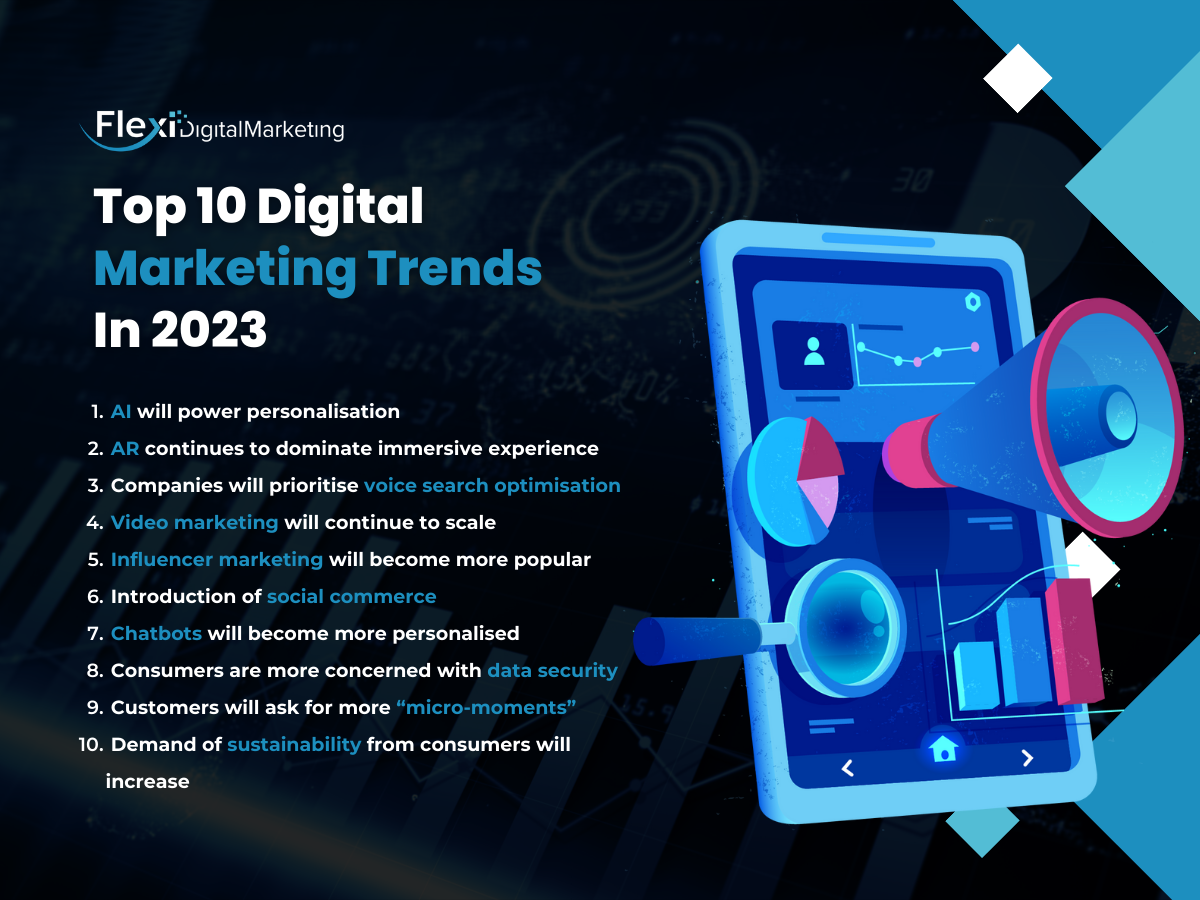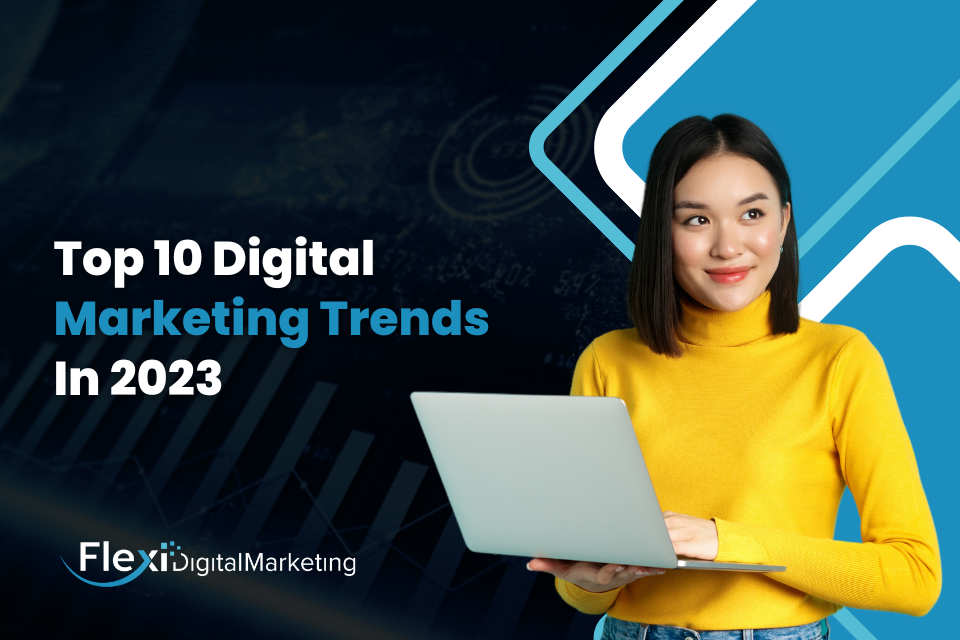Digital marketing has become a vital component of any successful business in today's age. Companies can engage with their customers in new and exciting ways, building stronger brand relationships and driving growth through digital marketing.
However, as technology advances and consumer behaviours change, the digital marketing landscape is continuously evolving. Many trends and tools are being introduced left and right each year. As such, businesses need to stay ahead of the curve and understand the latest digital marketing trends that will shape the industry.
Thus, in this article, we tackle 10 digital marketing trends in 2023. From AI-powered personalisation to social commerce, influencer marketing to sustainability, and social responsibility, this list will help businesses understand the latest developments in the industry and adapt their strategies to remain competitive.
Is Digital Marketing an Ever-Changing Industry?
In short answer, yes, digital marketing is an ever-changing industry. As mentioned earlier, it is constantly developing due to technological developments and changes in customer behaviour. Sporadically, new platforms, tools, and trends emerge regularly.
As such, digital marketing requires marketers to remain up-to-date and adapt their strategies accordingly. This industry demands the ability to be agile and flexible, as strategies and tactics that were effective in the past may not work in the future.
Top Digital Marketing Trends For 2023
Keeping up with these changes requires a commitment to ongoing learning and development, staying informed about the latest industry news and trends, and experimenting with new ideas and approaches.
As such, here are some new digital marketing trends for 2023:

1. AI-Powered Personalisation
Artificial Intelligence (AI) has revolutionised how digital marketers create, manage, and optimise their campaigns. These digital marketing trends allowed digital marketers to quickly scrutinise vast amounts of data to identify trends that would be difficult to detect. Likewise, AI-based tools enable digital marketers to develop more precise targeting strategies and personalise content for different audience segments.
As a result, digital marketers can better understand customer needs and deliver more relevant messages that drive higher engagement and conversions.
That is why recently, AI has seen a dramatic increase in being used to personalise digital marketing efforts, delivering targeted messaging and content to specific individuals based on their interests and behaviours. In fact, according to a report by Twilio Segment, 92% of enterprises worldwide are using AI to drive more personalised experiences to customers.
2. Augmented Reality
Recently, many people have said that augmented reality (AR) is one of the future digital marketing trends. And that's right! Recently, AR is quickly becoming an essential tool for digital marketers, allowing them to create immersive customer experiences. It can be used in various ways, such as creating virtual product demonstrations, providing interactive tutorials, or even creating immersive shopping experiences.
As such, businesses use this new technology to enhance the customer experience by enabling them to interact with products in a virtual environment. It also helps marketers create more engaging content, combining real-world elements with digital ones. Likewise, marketers can provide an interactive and engaging experience that can help drive sales and increase customer engagement.
And recently, with the rapid development of AR technology, businesses are continuously using this to create immersive brand experiences that engage customers in new and exciting ways. In fact, according to HubSpot, 14% of digital marketers plan to explore VR/AR for the first time in 2023.
3. Voice Search Optimisation
Voice search optimisation is one of the industry's top emerging digital marketing trends. As voice assistants become more popular, businesses must ensure their content is augmented for voice search queries. This means creating content targeted to voice search users and ensuring that it is optimised for the keywords used in voice searches.
In fact, according to research conducted by eMarketer, about 33.2 million consumers in the US are expected to shop using the voice search feature. Thus, digital marketers must optimise content for voice search to ensure their brand is discoverable via voice commands. In addition, businesses need to ensure that the content they create is optimised for their audience's specific devices so that it can be easily found through voice searches.
4. Video Marketing
Video marketing has become an essential and top digital marketing trend. It is a powerful tool that allows businesses to reach their target audience more engagingly and interactively.
With the help of video marketing, businesses can create informative and entertaining content, thus increasing their chances of success. Furthermore, video content can be used for various purposes, such as product promotion, educational videos, tutorials, customer testimonials, etc.
Recently, video marketing has dominated the digital arena, with more businesses using live streaming, 360-degree videos, and other interactive video experiences. In fact, according to Wyzowl, about 92% of marketers say they've gotten a good ROI from video marketing.
5. Influencer Marketing
Influencer marketing is one of the utmost popular digital marketing trends, perfect for small businesses. For many years, it has become an integral part of the internet and a powerful tool that has helped brands reach their audiences and generate more sales. It has increased brand awareness, generated leads, and driven sales.
With influencer marketing, brands leverage the power of influencers to reach potential customers and deliver content that resonates with their target audience. Through it, companies-built trust their customers.
Recently, influencer marketing continued to grow, with more brands collaborating with social media influencers to reach.
6. Social Commerce
For many years, the use of social media in digital marketing has increasingly become important. It allows them to reach potential customers who wouldn't otherwise be exposed to their products or services. In addition, through social media, businesses can create targeted campaigns tailored to their target audience and maximise their ROI.
Recently, a new feature was introduced in social media and digital marketing trends called social commerce. It is a relatively new concept, but it is quickly gaining popularity. It refers to using social media platforms such as Facebook, Instagram, and Twitter to facilitate online shopping and buying.
Social media platforms have continuously developed this feature and improved businesses' e-commerce capabilities, allowing them to sell products directly to consumers through social media. In fact, according to Statista, the worldwide revenue for social commerce will be valued at 724 billion USD in 2022. This is expected to increase to 6 trillion USD by 2030.
7. Chatbots
Chatbots have become a powerful tool in digital marketing, enabling businesses to interact with their customers in real-time. It can also help marketers automate mundane tasks such as responding to frequently asked questions or providing product recommendations. This saves time and resources, allowing marketers to focus on more essential tasks such as creating content or optimising campaigns.
As such, chatbots are becoming an essential part of digital marketing strategies. It helped businesses save time and money while improving customer experience. In fact, chatbots are expected to become more sophisticated, offering personalised customer service and support and becoming a vital tool for businesses to engage with customers and answer their queries.
With the help of AI technology, chatbots can be programmed to understand customer needs and provide personalised responses. This helps companies build better relationships with their customers and increase customer satisfaction.
8. Privacy and Data Security
Digital marketing has revolutionised how businesses reach and engage with their customers. However, it has also become a risk regarding data privacy and security. Many consumers have increasingly become wary of giving out their information to businesses. In fact, according to a study conducted by the Pew Research Centre, 79% of their respondents said they are concerned about how companies use their data.
As such, with increased concern over data privacy, businesses will need to ensure they comply with privacy regulations and take action to protect customer data. It is also vital to ensure that companies adhere to data privacy and security regulations. Companies must protect customer data from unauthorised access, use, disclosure, modification, or destruction.
Likewise, data security measures such as encryption and authentication can help protect customer data from malicious actors. Companies should also have policies to ensure customer data is only used for legitimate purposes. Additionally, customers should be informed about how their data is being used and allowed to opt out of any services they do not wish to participate in.
By taking these steps, companies can provide their customers with a safe and secure environment while still engaging them through digital marketing campaigns.
9. Micro-Moments
Micro-moments are one of the latest digital marketing trends in the industry. It refers to brief time windows when consumers turn to their devices to fulfil an immediate need or answer a question. These moments are often spontaneous and occur throughout the day, such as when a person is waiting for a bus or standing in a queue.
As such, digital marketers can leverage micro-moments by delivering relevant, timely content that addresses the needs of consumers during these brief windows of time, providing a solution or information that can help them to act or make a purchase.
Per se, businesses must deliver relevant, timely content that addresses customers' needs in their "micro-moments" - the brief windows of time when looking for specific information or solutions.
10. Sustainability and Social Responsibility
Recently, many consumers are increasingly concerned about businesses' impact on the environment and society. Consumers are becoming more environmentally aware and are looking for products and services that align with their values and beliefs. In addition, consumers are becoming more aware of businesses' impact on society.
As such, most are looking for businesses committed to sustainability and social responsibility. Companies committed to sustainability and social responsibility are seen as more trustworthy and ethical. Consumers are more likely to support and remain loyal to these businesses.
Furthermore, businesses that adopt sustainable and socially responsible practices are more likely to attract and retain top talent, as employees also look for companies that align with their values and beliefs. Companies that are seen as proactive in promoting environmental or ethical causes will be perceived more favourably by customers. This can lead to increased loyalty and, ultimately, higher sales.
Conclusion
In conclusion, the digital marketing industry is constantly evolving. As such, staying ahead of the curve is essential for businesses to remain competitive. By embracing these top trends, businesses can engage with their customers in new and exciting ways. Through these, they can build stronger brand relationships and drive growth in 2023 and beyond.
If you want to hear more about the latest digital marketing trends, subscribe to our newsletter!


